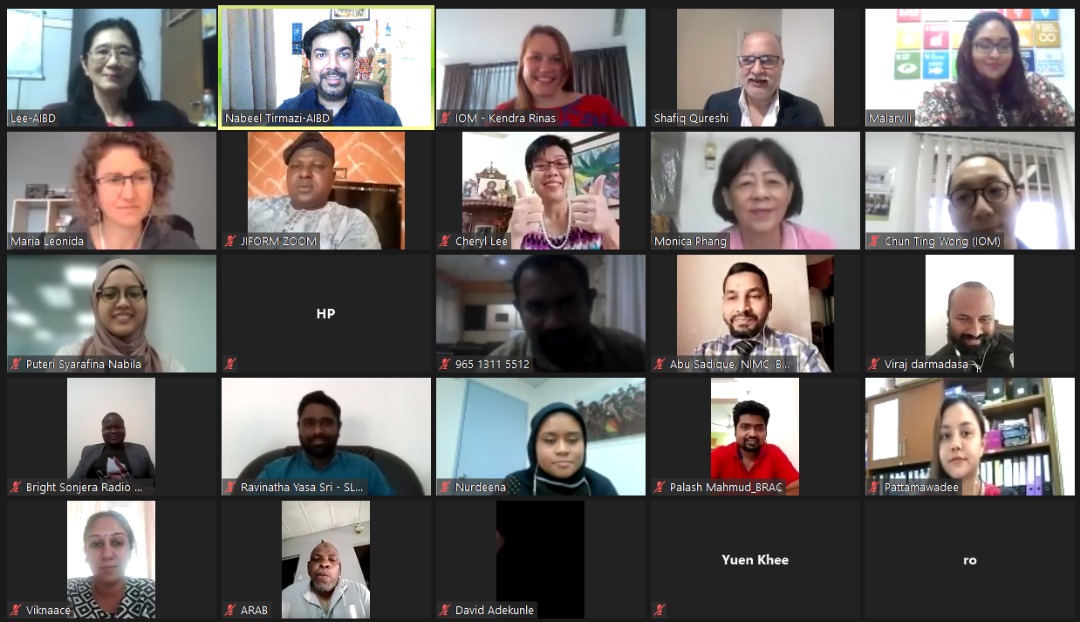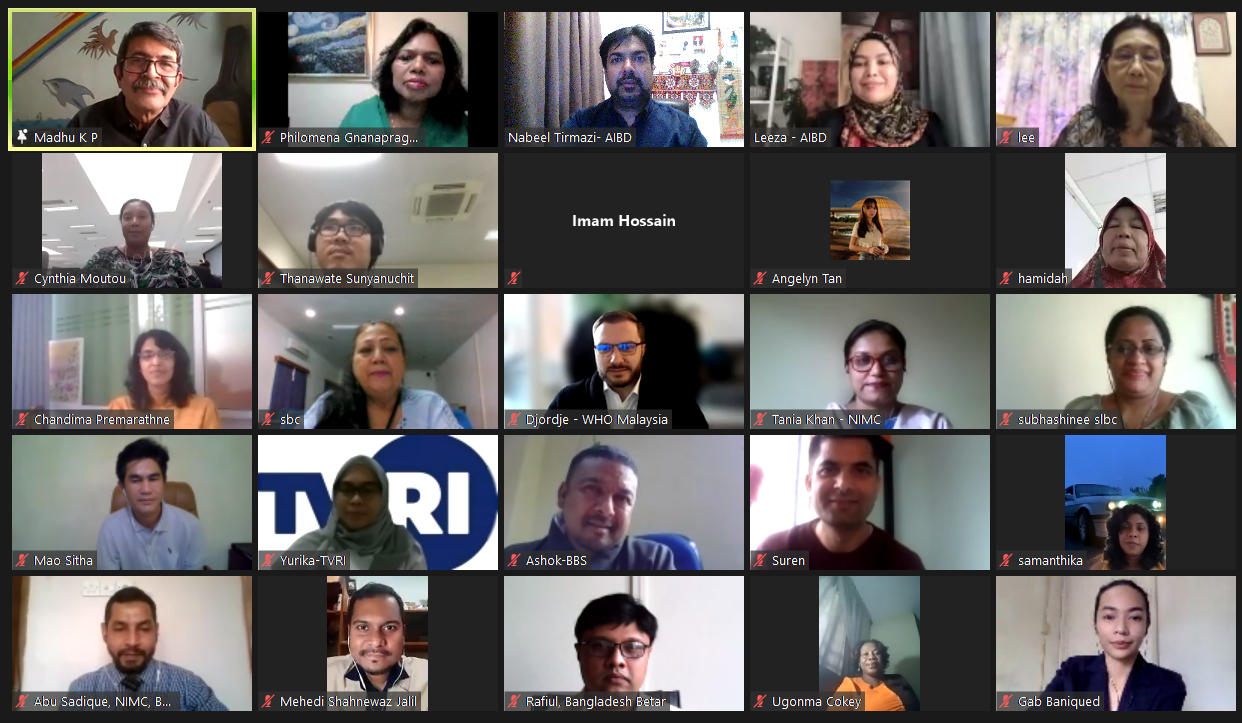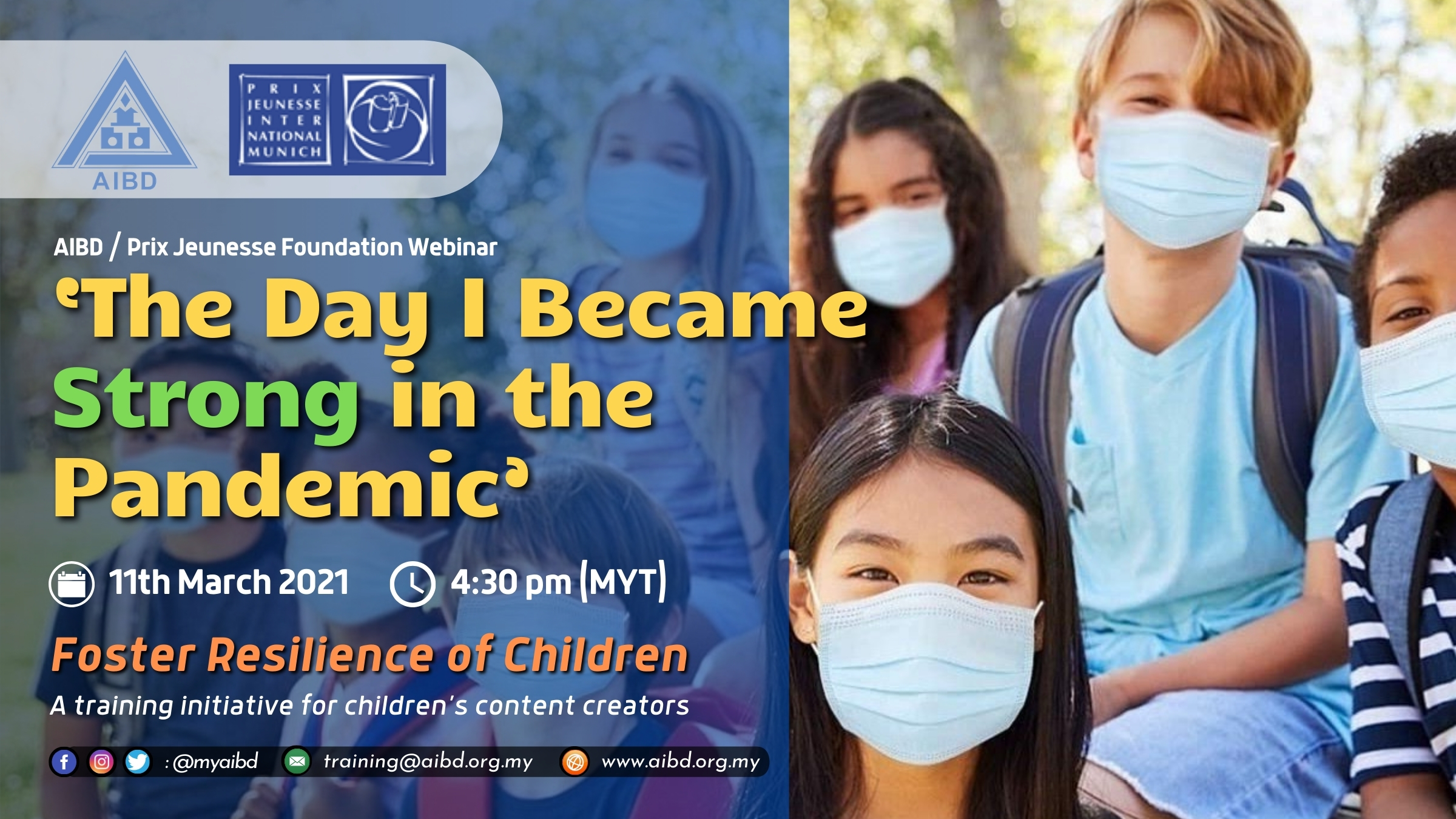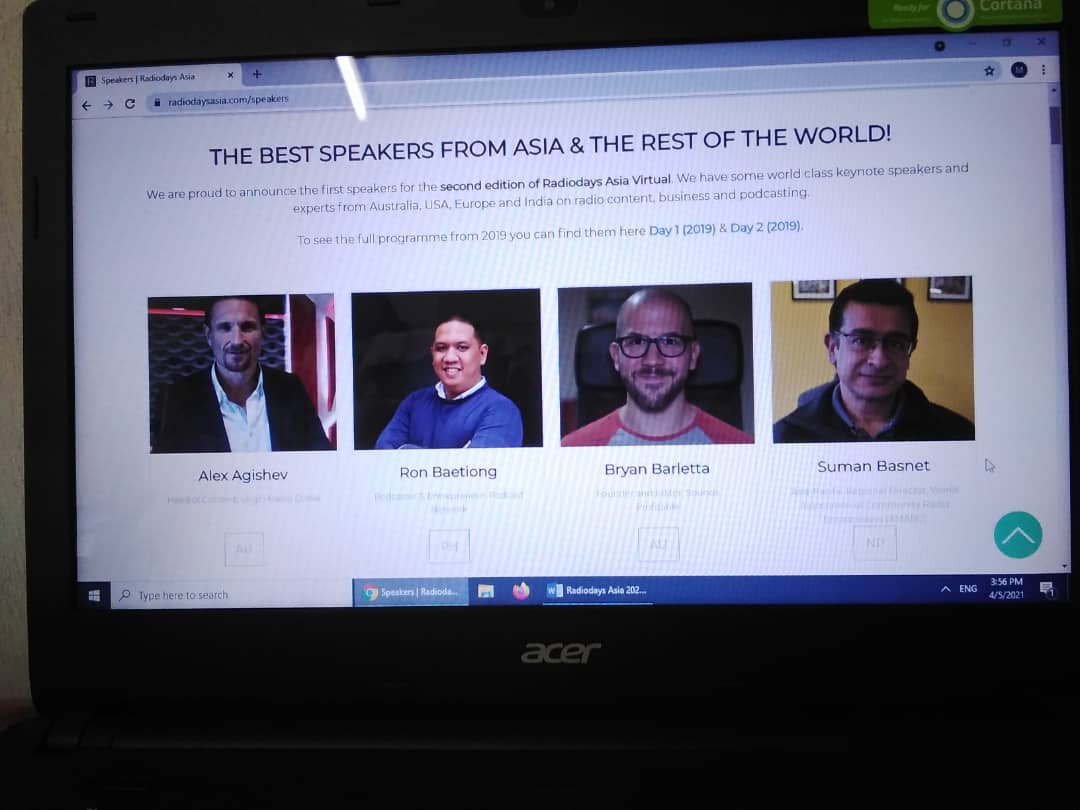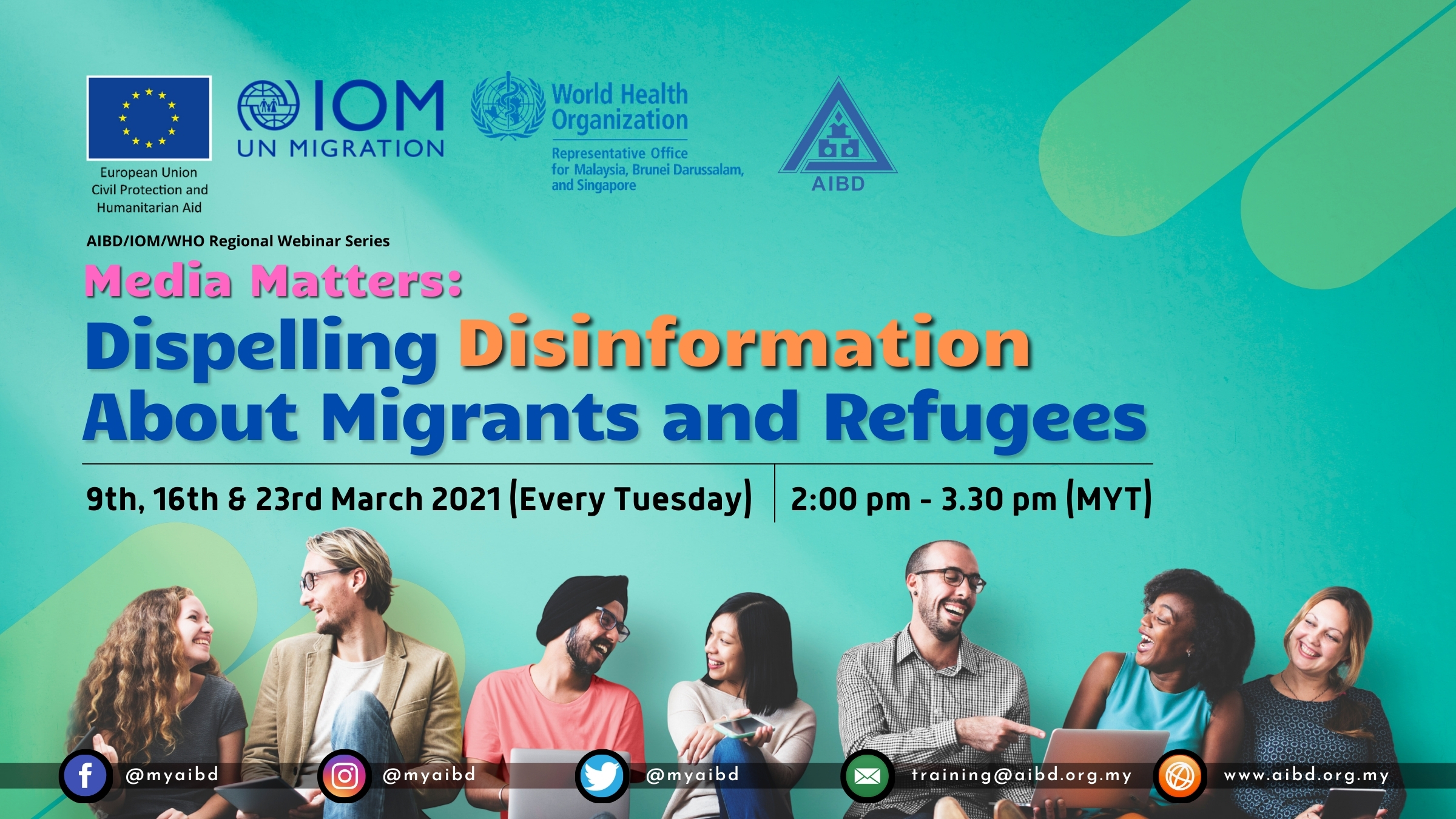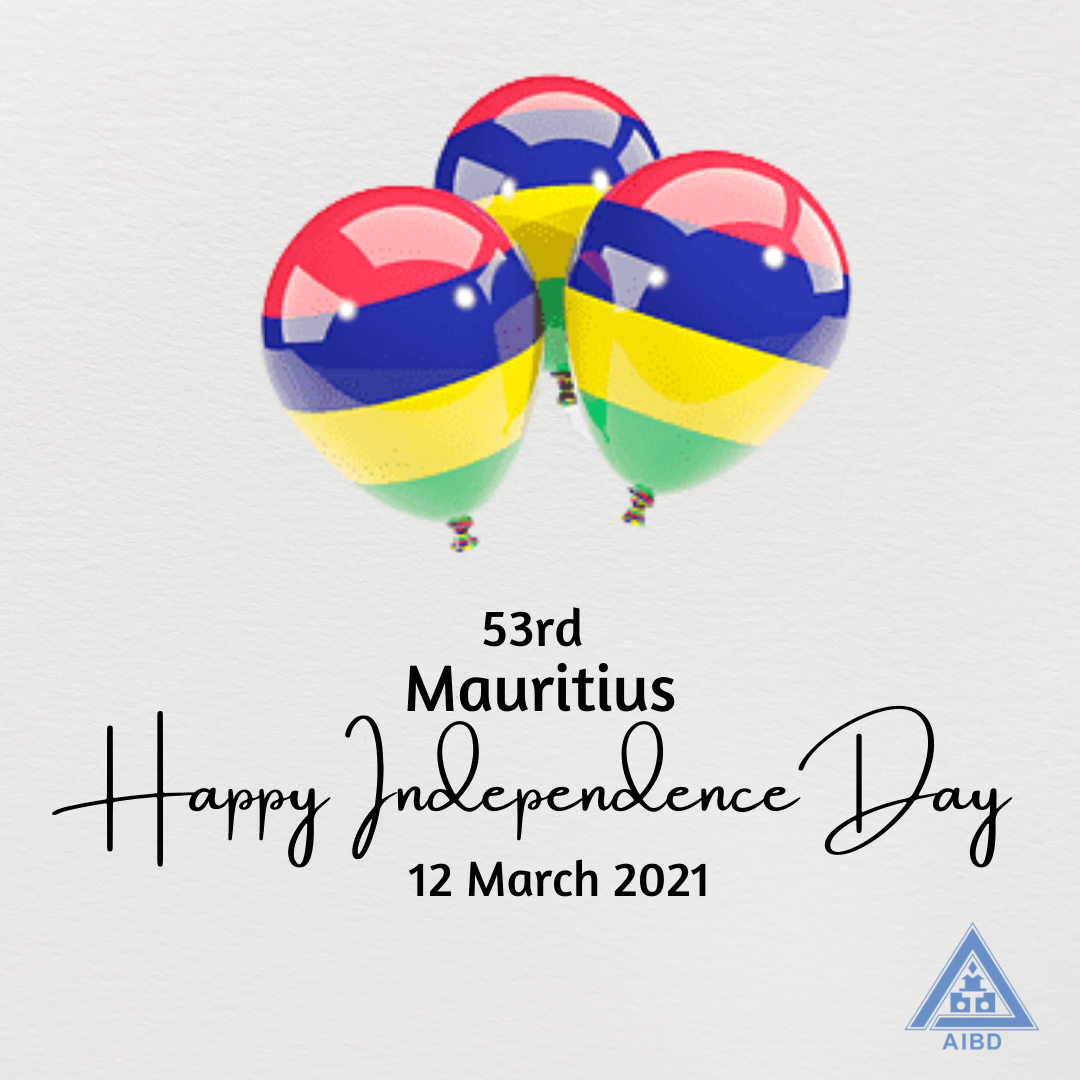The International Organisation for Migration (IOM) Malaysia is committed to an inclusive, post-COVID recovery that addresses the needs of all populations, including migrants.
Its Chief of Mission, Ms Kendra Rinas said this calls for the cooperation of the media to speak about inclusiveness for all, so that we can overcome COVID’s health and economic impact.
She make this remarks while closing of the 2nd series of AIBD/IOM/WHO regional webinar on media matters: Dispelling Disinformation about Migrants and Refugees on 23rd March2021. The webinar was hosted from Kuala Lumpur over an interval period of three weeks on every Tuesday, that is 9th, 16th and 23rd March.
She highlighted a few key points for the media to ponder as follow:
- Media is extremely essential at framing the narrative and response on COVID and on migrants;
- Media need to play an important role to protect Human Rights of all people to overcome the anxiety of COVID pandemic;
- To end stigma and the root causes so as to help protect all man kinds;
- Media have a powerful voice to address and prevent stigma by speaking out against violence, and help us all recover together.
“We know this is not an easy task, but we’re grateful for all of your work to address these issues” she said.
On a similar address, AIBD Director, Ms Philomena Gnanapragasam said migrants and refugees are sensitive issues for any countries. Hence, it is the ultimate roles of the media practitioners to safeguard the well-being of this vulnerable groups through their fair and balanced reporting.
“Media practitioners should be mindful of negative expressions that can create or increase social stigma, and need to focus on inclusive language by upholding humanity for this vulnerable groups”, she stressed.
Day 3 of the webinar is a panel discussion with three speakers who shared their respective views on the topic “Forging Forward: Solution Driven Media Reporting On Migration And Refugees”.
JIFORM regards – Migrants are Economic Developers
The first speaker for the panel discussion is Mr Ajibola Abayomi, President, Journalists International Forum for Migration (JIFORM), Chief Executive Officer/Managing Director, The Lead Magazine, Nigeria.
He tasks Journalists on effective terminologies in Migration Reporting and urged media practitioners to use the tools of journalism to dispel disinformation about migrants and refugees. “Considering the complexity of migratory issues, journalist diversifies sources of information, journalistic genres, themes and angles. Make use of the right terminologies” Ajibola said.
JIFORM, comprising over 300 journalists covering migration across the continents, and as media professionals who were at the vintage position to reel out undiluted information about migrants and refugees and should continue to do the needful”.
Ajibola recommended that every journalist should key into the United Nations Verified Campaign to stem the tide of disinformation, saying JIFORM supported the position of the UN Secretary General, Antoni Guterres who urged journalists to “flood internet with fact and science while countering the growing scourge of misinformation-a poison that is putting even more lives at risk.”
He pleaded with journalists to eschew any act of primordial sentiment that could encourage xenophobic attack and urged them to focus on quality information that could promote justice for the migrants being abused in the Middle East under the Kafala slavery system and those whose wages were being withheld in several parts of the world.
“We all saw what happened in South Africa two years ago. Media should not be part of those spreading false information about the migrants and refugees at any level. Migrants are economic developers while refugees deserve empathy and protection. The South Africa saga was regrettable and should not happen again.
The JIFORM president counselled that migration journalists should not allow hatred, racism, discrimination to becloud the judgment on migrant news stories adding that media practitioners should decrypt and go beyond speeches of hatred, racism, xenophobia and discrimination with empathy and vigilance.
JIFORM was formed in 2018, headquartered in Lagos, Nigeria and is reputable for being the organizer of annual global migration summit, several workshops/training for journalists. On 24th and 25th February 2021, JIFORM organized the maiden African Migration Summit in partnership with the Nekotech Center of Excellence, in Accra Ghana.
Other members of the panel were Maria Leonida, Director of Karpos, Media Educator, Centre of Education & Intercultural Communication, Athens, Greece while Shafiq Ahmad is the Editor/Journalist-In-Charge of Asia-Pacific Desk for Anadolu Agency Turkey, Ankara with Malarvili Meganathan, Media & Communications Consultant, Trainer IOM-UN Migration Malaysia as the moderator.
Vulnerable Communities Portray in an Educational Documentary Film
Maria shared her video presentation titled “Portrait Day” which is an educational material and analysis on documentary production with vulnerable communities. The short film analyse non-fiction filmmaking and shaping stories out of their experiences and struggles, and how the framing may work which is not necessarily parallel to the more speedy journalism-media environment.
She explained that the short film emphasized to give voice of these vulnerable groups through teaching and learning media expression. It is important to avoid the use of stereotypical, negative expressions that can create or increase stigma, and focus on inclusive language. This aim is to promote inclusive approach in reducing prejudice and promoting social cohesion of vulnerable groups.
Migration Stories must Provide Solutions
Shafiq Ahmad shared in his presentation on the “Challenges Restraining Journalists from Solution Journalism”, suggesting that journalists should follow the Ethical Journalism Network’s guidelines on the Five Points Guide For Migration Reporting.
The 5 points guide for Migration Reporting are:
- Facts Not Bias;
- Know the Law;
- Show Humanity;
- Speak for All; and
- Challenge Hate
An experienced journalists covering conflicts and war zones areas, he shared real cases studies from different parts of the world including Afghanistan, indicating that migration benefits all of us. Shafiq outlined some of the Don’ts of Migration Journalism as:
- The act of the individual and the bad reporting actually traumatize the entire migrant community;
- The story should be based on facts, not on the status of migrants and refugees living in that country;
- Refugees or migrant terms should not be generalized in such reports, and their names and references are sufficient;
- When we generalize the entire migrants or refugee community, we actually create negativity for them and the negative impact for one incident remains in the host country for a long time to come.
The webinar has ended successfully with encouraging responses from media practitioners representing 16 countries from the Asia-Pacific region and beyond including Africa.
Media needs to speak inclusiveness to over come COVID’S health & economic impact.
The International Organisation for Migration (IOM) Malaysia is committed to
Conclusion of First Phase of AIBD Health Journalism Training Initiative
AIBD 1-month Online Workshop/ Mentoring Sessions for Health Journalists and
A Decade of Innovation and Disruption: Impact on Broadcasters
By Dr Amal Punchihewa Consultant and Advisor, AIBD Asia-Pacific Institute
Open for registration – Covering the COVID-19 vaccine: What journalists need to know
COVID-19 has posed major challenges for independent media professionals, both
Telling Strong Stories -The Day I Became Strong In The Pandemic
The COVID-19 pandemic has caused a worldwide crisis in 2020,
Radio has immense power to create milestones
Radio is a powerful tool that continues to promote “dialogue,
Media Matters: Dispelling Disinformation about Migrants & Refugees.
Many communities around the world have responded to COVID-19 with
53rd Independence Day Celebrations, Mauritius
AIBD takes this opportunity to wish 53rd Independence Day celebrations to MAURITIUS
A Decade of Innovation & Disruption: Impact on Broadcasters
AIBD Regional Webinar on 5G A Decade of Innovation & Disruption:


